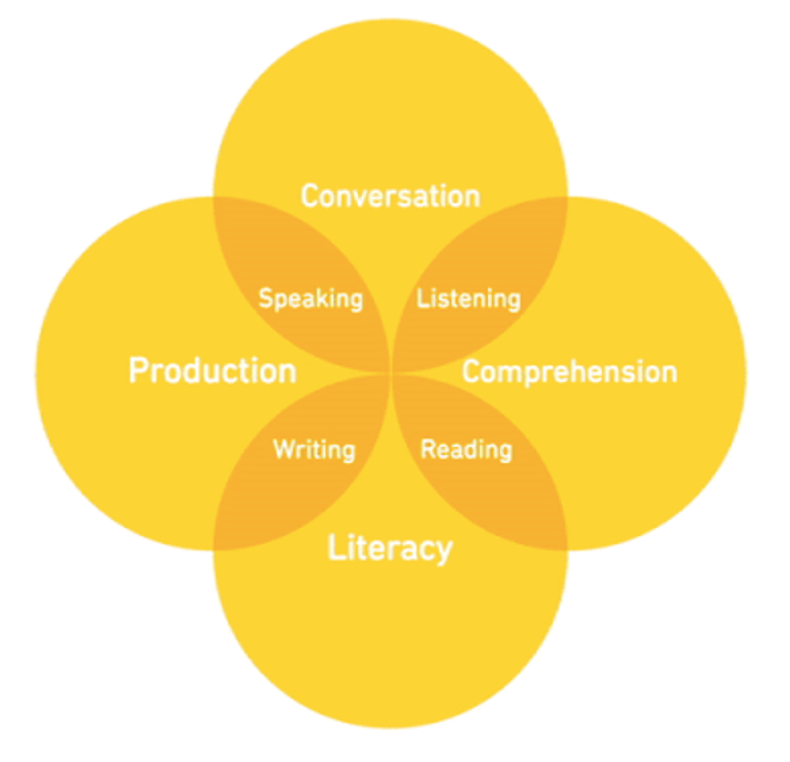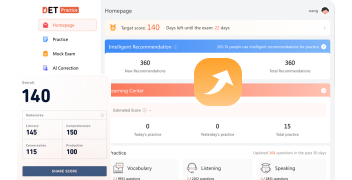Duolingo English Test Tips 2
Hello, everyone! In the previous article Duolingo English Test Tips 1, we learned what Duolingo English Test is and the difference between Duolingo English Test and the TOEFL and IELTS exams.
This article focuses on detailing the skills measured by the Duolingo English Test, outlining the types of questions featured, and explaining the categorization of these questions.
Duolingo English Test Overview
l Adaptive objective questions: including reading selection, reading fill-in-the-blank, interactive reading, dictation, sentence reading, interactive listening-listening response
l Subjective questions: mainly based on speaking and writing, including picture speaking, picture writing, reading speaking, reading writing, listening speaking questions, interactive listening-listening summary (writing type)
l Interview questions: mainly based on speaking and writing, including: sample writing, sample speaking
In addition, unlike the conventional English proficency test, which divides English proficiency into four items: listening, speaking, reading, and writing, the Duolingo English Test redefines four different assessment dimensions, they are: Comprehension, Literacy, Conversation, and Production.
Four Major Scoring Items
u Comprehension: mainly tests the reading and listening abilities of English. This item has the highest weight in the overall four items. For students who are relatively weak in speaking and writing abilities, they can focus on breaking through the comprehension item. If the comprehension item score is high, the corresponding total score will also increase.
u Literacy: mainly tests the reading and writing abilities of English. This item has the second-highest weight of the overall four items, and it is also relatively important for the total score.
u Conversation: mainly tests the listening and speaking abilities of English. This item has the third highest weight in the overall four items, next to Literacy.
u Production: mainly tests the speaking and writing abilities of English. This item has the lowest weight in the overall four items.

Now, we have learned the four abilities that Duolingo English Test assesses, and we can find that each ability is a combination of two traditional listening, speaking, reading, and writing items. You can also refer to the picture above so that you can see the corresponding English abilities of each item very intuitively.
Let’s take a look at the table below:
| Question Categories | Question Types | TIME | FREQUENCY | Score Items |
|---|---|---|---|---|
| Reading | Read and Select | 5 seconds | 15-18 | Literacy & Comprehension |
| Fill in the Blanks | 20 seconds | 6-9 | Literacy & Comprehension | |
| Read and Complete | 3 minutes | 3-6 | Literacy & Comprehension | |
| Interactive Reading | Complete the Sentences | 7 or 8 minutes for the entire section | 2 sets of 6 questions | Literacy & Comprehension |
| Complete the Passage | 7 or 8 minutes for the entire section | |||
| Highlight the Answer | 7 or 8 minutes for the entire section | |||
| Identify the Idea | 7 or 8 minutes for the entire section | |||
| Title the Passage | 7 or 8 minutes for the entire section | |||
| Listening | Listen and Type | 1 minute | 6-9 | Conversation & Comprehension |
| Interactive Listening | Listen and Respond | 4 minutes | 2 sets of 5-6 questions | Conversation & Comprehension |
| Summarize the Conversation | 75 seconds | |||
| Speaking | Read Aloud | 20 seconds | 3-6 | Conversation & Production |
| Listen, Then Speak | 1 minute, 30 seconds | 2 | Conversation & Production | |
| Speak About the Photo | 1 minute, 30 seconds | 1 | Conversation & Production | |
| Read, Then Speak | 1 minute, 30 seconds | 1 | Conversation & Production | |
| Speaking Sample | 3 minutes | 1 | Conversation & Production | |
| Writing | Write About the Photo | 1 minute | 3 | Literacy & Production |
| Interactive Writing | 5 minutes for step 1 3 minutes for step 2 | 1 set of 2questions | Literacy & Production | |
| Writing Sample | 5 minutes | 1 | Literacy & Production |
I believe that through the table above, you have a preliminary understanding of the types of questions corresponding to each Duolingo English Test assessment item.
Okay, by now we should have a general understanding of the distribution of question types. In the following articles, we will explain in detail all the question types that appear in the Duolingo English Test, as well as the preparation and test-taking strategies. See you next time!
You may read more tips about DET at:





